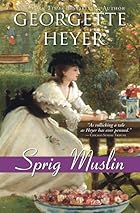Yesterday I finally got back into town after my combined RWA National and family reunion trip to Atlanta, so I've got a lot of blogging to catch up on. I also need to post about my RWA experiences at some point. Suffice it to say it was a good conference, and I came out of it with a few new ideas and new connections.
For now, well, I'll start by catching up on July for the 2013 TBR Challenge.
Sprig Muslin, by Georgette Heyer.
This month's theme was the Classics--a classic author, book, trope, or however you choose to interpret it. I ended up going with Georgette Heyer, since the Regency genre as we know it certainly wouldn't exist without her. I read most of her books in high school, since my library had a good collection, but I don't remember this one.
I have a confession to make. Despite her genre pioneer status, I only like Heyer's books--I don't love them. I feel the same way about Tolkien and high fantasy, incidentally, albeit for different reasons. The fact that many of my favorite books wouldn't exist without them doesn't make their books my favorites. With Tolkien, the issue is that I always feel like I'm watching his characters from a distance, that I'm observing the stories rather than connecting to and participating in them. With Heyer...well, ever since I read A Civil Contract I haven't been able to forgive her for what she did to Jenny Chawleigh. Jenny wasn't of the gentry or the aristocracy, therefore she didn't deserve a truly happy ending--at least, that's the subtext of the book as I read it. Ot She didn't get love and devotion; she got respect and contentment. And as someone whose own ancestry is FAR from genteel, I got angry about that.
I know a lot of people love Heyer and love A Civil Contract in particular for its realism. And I can totally understand and respect that. But for whatever reason, that book's ending triggered something personal for me that changed how I look at her work as a whole. And, yes, I realize I'm not being wholly consistent. I read books with aristocratic characters all the time. Two of my favorite fictional crushes are Lord Peter Wimsey and Count Aral Vorkosigan (not that either of them had any trouble conjuring up romantic feelings for a commoner, come to think). The fact that the Duke of Wellington was as elitist as can be doesn't make me admire him any the less--though there are a few quotes of his where I always shake my head in exasperation that anyone that smart could say something that stupid.
But when I'm reading fiction and I feel like the author is endorsing the idea that I ought to regard anyone as superior or inferior because of an accident of birth, I end up, shall we say, in an argument with the text. And, yes, I know, Heyer is a product of her times...but she's a contemporary of Dorothy Sayers, and while the class issues are certainly there in Sayers, they're not on anything like the level of A Civil Contract. And maybe throwing in an American author is apples to oranges, but Louisa May Alcott is decades earlier and has the Phebe-Archie secondary romance in the Rose books, where Phebe is an almost literal nobody. She started out as a servant in the family, and IIRC came from a workhouse and didn't know who her parents were. Mind you, most of Archie's family disapproved of the match just as much as you'd expect of a family with generations of money and status behind it, but you never feel like the text is telling you they're right.
Anyway...all that said, I enjoyed Sprig Muslin. It's a classic Heyer romp--frothy, madcap, and fun. I read it in less than a day, and enjoyed every word. However, I would've liked to see more interaction between the hero and heroine, and I got to arguing with the text again at the end when it was made clear that the secondary heroine, a young, headstrong beauty, belonged with her future husband because he'd keep her in check, which her doting guardians had never managed to do. I got the sense he'd be a benevolent husband/guardian, but it still gave me a bit of a squick.

This comment has been removed by a blog administrator.
ReplyDelete